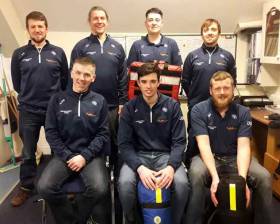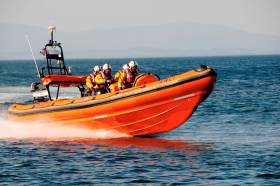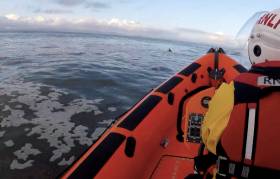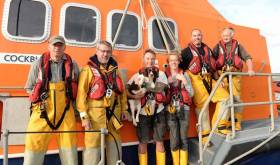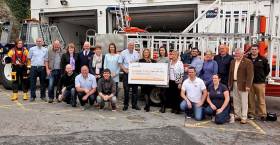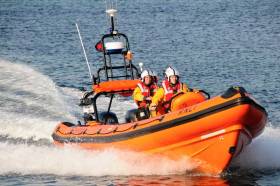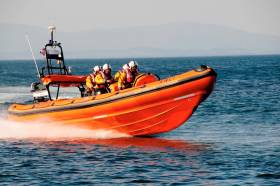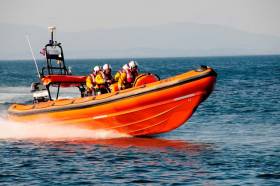Displaying items by tag: Bundoran
This weekend’s Bundoran RNLI Soapbox Race will no longer be going ahead on Sunday 2 June due to poor weather forecast for the region.
In a statement, the organisers said: “It is with regret that we have decided to cancel this Sunday’s soapbox race event.
“Following consultation with weather charts and Met Éireann, the forecast is not favourable to run an event outdoors. For the comfort and safety of our volunteers, participants and spectators the organising committee has made the difficult decision to cancel the event.
“We are sorry to cause any disappointment, particularly to those who have already built soapboxes. We would like to thank those who had volunteered their time to help out at the event.
“Our annual flag day street collection will go ahead on Sunday and we thank you in advance for your generosity and continuing support of Bundoran RNLI Lifeboat.”
Bundoran Lifeboat Crew Gears Up For Soapbox Sunday
Final preparations are being made ahead of this weekend’s Bundoran RNLI Soapbox Race which takes place this Sunday 2 June at Astoria Road.
Now in its eighth year, the event is organised and hosted by the volunteer crew of the Bundoran RNLI lifeboat and is a major fundraiser for the charity.
The event is expected to attract as many as 2,000 soapbox enthusiasts and their supporters with race winning between 1pm and 4pm, weather permitting.
The prize up for grabs is the highly coveted Perpetual Cup and 12 months of bragging rights.
And the ever-popular €1,000 ball race will also take place directly after the soapbox final has been run, with balls on sale at just €5 from lunchtime on the day.
Event director Cormac McGurren says that the crew is looking forward to the day.
“The soapbox race is always the talk of the station for the weeks and months before it happens. It’s a fun family day out with lots of thrills and spills expected.
“We would like to thank in advance all of our sponsors, prize donors and local volunteers who are helping to run the event and also to sell the balls.”
Those wishing to race a soapbox on the day are encouraged to register online, though last-minute registrations on the day will be accepted.
There will be a number of traffic restrictions in place this Sunday to facilitate the race. Astoria Road will be closed from 8am till 7pm on Sunday at the junction with Main Street.
Traffic for Waterworld, Bundoran Adventure Park and Ozanam House should use Promenade Road and Atlantic Way. Traffic for Main Beach, Great Northern Hotel and Bundoran Golf Club should use Sea Road. Main beach car park will be open for parking as normal (with access via Sea Road).
Volunteer crew members at Bundoran RNLI recently undertook an intensive casualty care course, receiving specialised training to enhance their lifesaving skills at sea.
The course ran by RNLI trainer Jen Forsyth, focused on effective hands-on treatment rather than complex theory or diagnosis and provided crew with the skills to confidently treat casualties.
Maritime search and rescue medicine is a specialised field and the RNLI’s unique course prepares lifeboat crew to manage the situations that are encountered in the operational environment.
"Maritime search and rescue medicine is a specialised field"
During the training each participant had to pass both a written and a practical scenario to demonstrate their individual skill. At the end of the course all crew took part in final practical scenarios where teams of casualty carers treated multiple casualties.
Speaking following the training, Shane O’Neill, Bundoran RNLI Lifeboat Training Coordinator, said: ‘Our crew is prepared to drop everything and risk their lives to save others at a moment’s notice. Their lifesaving work is essential, often difficult and sometimes dangerous. And with only one in 10 volunteers joining the RNLI from a professional maritime occupation, training is especially important. Here in Bundoran, our lifeboat crew train together every week, both at sea and ashore.
‘Casualty care is a crucial link in the search and rescue chain of survival that allows lifeboat crews to save lives at sea. Casualties have to be treated and kept alive often in a sometimes unforgiving and hostile environment until the casualty can be handed into the care of our emergency services colleagues. Our crew will continue to practice and hone these skills on a regular basis through scenario based training.’
Long Night For Bundoran Lifeboat As Training Exercise Turns Into Five-Hour Rescue
#Lifeboats - The volunteers with Bundoran’s RNLI lifeboat had a long night on Tuesday (26 February) when a routine training exercise turned into a five-hour rescue.
The Co Donegal lifeboat crew received the call for help at 8.30pm to a 30ft fishing vessel with three people onboard that had suffered engine failure seven miles off Innismurray.
Immediately diverting to the scene, the lifeboat crew — helm Brian Faulkner and crewmembers Mark Vaughan, Fergal Muller and Chris Fox — reached the vessel at 9.10pm and established a tow.
Conditions were ideal for the callout with a low swell and little wind. However, due to the size of the fishing vessel, the tow took a number of hours.
On reaching Mullaghmore, the volunteer lifeboat crew were replaced by their colleagues after spending the evening at sea in cold conditions. It was after 1.30am before the lifeboat crew reached home.
Commenting on the callout, Bundoran RNLI lifeboat operations manager Captain Tony McGowan said: “Our exercise night turned into a long callout for the crew and I want to thank them for their great work.
“Towing a vessel to safety can be a long and arduous job for a lifeboat crew but it’s an important one and we are happy to be able to assist.
“I also want to thank our volunteer lifeboat crew’s families who wait patiently at home and support the work of the RNLI.”
Bundoran Lifeboat Helps Surfer Safely To Shore
#Lifeboats - Bundoran’s RNLI crew assisted a surfer safely to shore on Saturday afternoon (10 November).
The volunteers launched after a member of the public raised the alarm, having spotted someone they thought to be in difficulty and waving their arm off Rougey Point in Bundoran.
The Irish Coast Guard requested the inshore lifeboat to launch at 3.28pm and 10 minutes later the lifeboat, helmed by Killian O’Kelly, was at sea.
Weather conditions at the time were blowing a light south-easterly wind and there was a three-metre swell.
Once on scene, the lifeboat crew observed that the surfer, while not in difficulty or in any immediate danger, was in a challenging part of the sea and some distance away from the shore.
The crew made the decision to take the teenager onboard and transport him safely back to Bundoran Lifeboat Station.
Speaking following the callout, O’Kelly said: “We would like to commend the member of the public who raised the alarm this afternoon — that is always the right thing to do if you see someone you think or know to be in difficulty.
“While this surfer was not in any immediate danger, he was some distance from shore so we made a call to assist him safely back to shore.”
Elsewhere, a person who went missing while kitesurfing off Ballybunion in Co Clare yesterday evening (Sunday 11 November) was found on land several hours later, as RTÉ News reports.
The kitesurfer, who had come ashore at Kilkee, was said to be suffering the effects of cold after spending as much as two-and-a-half hours at sea and was taken to hospital.
#RNLI - Courtmacsherry RNLI’s all-weather lifeboat was called out at 5.20pm on Friday evening (24 August) when a dog was reported to be stranded on remote rocks at the base of a steep cliff, near the Fuschia Walk in Courtmacsherry Bay.
Frederick Storey Cockburn — under coxswain Sean O’Farrell, with mechanic Colin Bateman and crew members Donal Young, Conor Dullea, Paul McCarthy and Enda Boyle — was launched immediately and reached the cliff face in 15 minutes.
The potential danger was that people would attempt to climb down the steep cliff in an attempt to get to the dog. There were also reasonable gusty winds at sea that evening, which made conditions tricky for working near the cliff face.
Two lifeboat volunteers manoeuvred into the rocky creek on an inflatable rescue dinghy and were able to persuade the black and white setter to get on board.
Once safely on board the lifeboat, the dog was given a prime seat as the lifeboat prepared to head for home.
Minutes later, a pleasure boat that was nearby had experienced engine failure and requested assistance.
The lifeboat immediately went to the aid of the 21ft pleasure boat — plus its skipper and his own dog — and took it in tow back to the safe surrounds of Courtmacsherry Pontoon by 6.45pm, where there was an emotional reunion with the owner of the stranded setter.
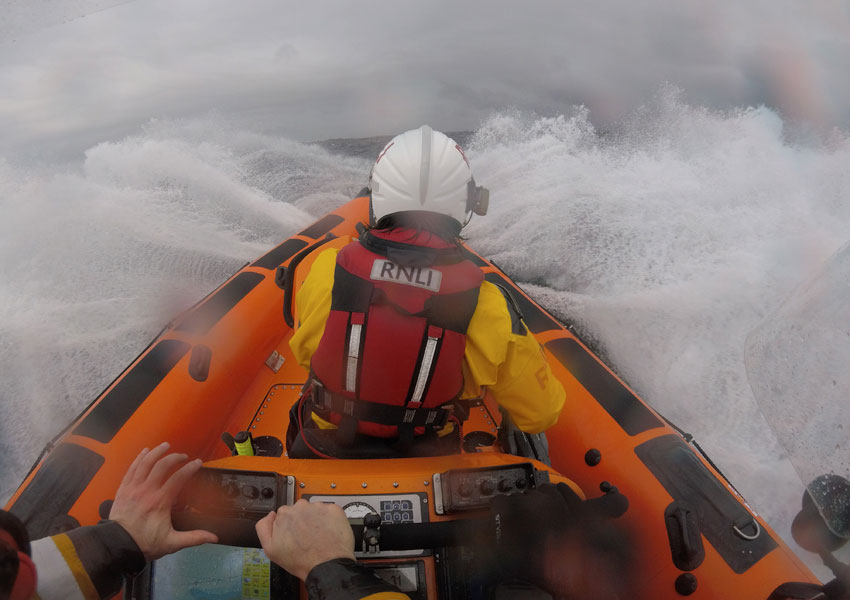
More recently, Bundoran RNLI in Co Donegal responded yesterday evening (Sunday 26 August) to a false alarm with good intent after three stand-up paddle boarders were reported to be in difficulty near Mullaghmore, Co Sligo.
The lifeboat, helmed by Killian O’Kelly was launched around 5.20pm minutes and immediately made its way to the scene amid difficult weather conditions, with heavy rain and reduced visibility.
Once on scene, the crew observed that the experienced trio, who had been competing in a downwind race from Mullaghmore to Bundoran, were not in any difficulty.
“They were all wearing lifejackets and carrying a method of communication,” O’Kelly said. “While this was a false alarm with good intent, we would like to commend the member of the public who raised the alarm as conditions at sea were not good at the time. We would always much rather launch to find all is well than not launch at all.
“With a lot of visitors enjoying the long Northern Bank Holiday weekend here in Bundoran, we would remind everyone planning a visit to the beach or the sea, to always respect the water.
“Plan your activity in advance, always wear a lifejacket and always carry a means of communication. Should you get into difficulty, call 999 or 112 and ask for the coastguard.”
#RNLI - A Co Tyrone family rescued by Bundoran RNLI this summer has returned to the lifeboat station to present the volunteer crew with a cheque for €5,000, proceeds of a successful fundraising event.
Ryan, Fianche, Cahir, Beth and Marc McCallion from Drumquin held a coffee morning at their home following the rescue in May, which saw three members of the family get caught in a rip current off the main beach in Bundoran.
Bundoran RNLI’s inshore lifeboat responded and the crew administered casualty care while the Irish Coast Guard helicopter Rescue 118 from Sligo was also tasked.
Some 300 people visited the McCallions’ coffee morning and €5,000 was raised.
Speaking after the presentation, Bundoran RNLI lifeboat operations manager Tony McGowan said: “We are overwhelmed by this generous donation from the McCallion family and we want to sincerely thank them and everyone who supported their coffee morning.
“We were happy to be of assistance to the family when they got into difficulty earlier this year and we were delighted that the rescue resulted in a good outcome for everybody.”
Bundoran RNLI received another substantial donation for €6,000 from Avolon Aerospace Leasing Co Ltd in Dublin to commemorate the 30th anniversary of the drowning of brothers Brendan and Thomas Patton and their cousin Eddie Donagher in a fishing tragedy in Donegal Bay.
The cheque was presented to the station by Brendan’s daughter Brenda, an employee of the company.
“This was an awful tragedy and we are grateful to Brenda and Avolon for thinking of the station in this way to mark the 30th anniversary of the drowning of Brendan, Thomas and Eddie,” McGowan said.
“This is a huge sum of money which will now go towards equipping our lifeboat and station and enabling our volunteers to continue their work in saving lives at sea.”
Bundoran Lifeboat In Two Sunday Calls For Assistance
#RNLI - Bundoran RNLI responded to two calls for assistance yesterday (Sunday 22 July) by an angling boat with a fouled propeller and a yachtsman suddenly taken ill.
The volunteer lifeboat crew launched after 10am following a call to go the aid of an angling boat, with two men onboard, which had got into difficulty when the boat’s propeller got tangled in lobster pots just off Bundoran.
The lifeboat, helmed by Killian O’Kelly and with three crew members onboard, launched in good weather conditions and made its way the short distance to the scene.
Having assessed that those onboard were safe and well, the lifeboat crew worked with the two men to free the boat and tow it safely back to shore.
Later in the day, the pagers sounded once more at 4.30pm, following a request from the Irish Coast Guard to assist a man who had taken ill on a yacht off Mullaghmore.
The lifeboat, helmed on this occasion by Brian Gillespie and with three crew members onboard, launched immediately and made its way to the scene. The Sligo-based coastguard helicopter Rescue 118 was also tasked.
On arrival, the lifeboat crew assessed the man before taking him onboard the lifeboat and administering casualty care. Once ashore, the man was treated for the effects of sea sickness but was otherwise safe and well.
Speaking following the callouts, Bundoran RNLI volunteer lifeboat operations manager Tony McGowan said: “We were delighted to be of assistance to both groups yesterday and glad that the outcomes resulted safely.
“We would remind everyone visiting the sea and enjoying Bundoran this summer to always respect the water. Always wear a lifejacket, always carry a means of communication and always let someone ashore know where you are going and when you are due back. Should you get into difficulty, call 999 or 112 and ask for the coastguard.”
Elsewhere, Larne RNLI was called to assist the crew of a small motorboat with engine difficulties at the entrance to Larne Harbour yesterday morning.
Larne’s volunteer lifeboat crew were preparing for a training session when the call came through at 10.10am. Both the all-weather lifeboat and inshore lifeboat launched to the casualty vessel.
Larne RNLI’s all-weather relief lifeboat the Duke of Windsor was was quickly on scene just north of the entrance to Larne Harbour. The crew quickly established a temporary tow to move the vessel out of the shipping lane to allow a P&O ferry to exit the harbour.
A line was then passed from the lifeboat and secured to the casualty vessel to tow the vessel back to Larne Boat Club.
In the shallow waters of Larne Lough the tow was passed to the inshore lifeboat Terry in order to guide the vessel onto the slipway for recovery.
Speaking after the callout, Larne RNLI coxswain Frank Healy said: “We are glad that the crew on the motor vessel knew to contact the coastguard when they got into difficulty, this is always the right thing to do. If we can be of assistance to anyone, our volunteers are here to help.”
This was the second launch for Larne RNLI in the last five days.
On Wednesday 18 July, the station's all-weather lifeboat launched with their colleagues at Bangor and Donaghadee as a precautionary measure for an aircraft inbound to Belfast City Airport that was experiencing technical difficulties.
The aircraft landed safely and all three lifeboats were stood down and returned to station.
Bundoran Lifeboat Rescues Kayaker In Difficulty
#RNLI - Bundoran RNLI has rescued a kayaker who got into difficulty between Rossnowlagh and Creevy Pier yesterday evening (Thursday 7 June).
The volunteer lifeboat crew were requested to launch their inshore lifeboat by Malin Head Coast Guard at 8.11pm following a report that a kayaker was in difficulty.
Helmed by Michael Patton and with three crew members onboard, the lifeboat launched immediately and made their way to the scene.
The Irish Coast Guard helicopter Rescue 118 from Sligo was also tasked.
Weather conditions at the time were described as good with a low swell and slow northerly winds.
Once on scene, the lifeboat crew observed that the casualty, who had capsized from her kayak, had been taken from the water by a group of four to five other kayakers
The group had placed the casualty back on her kayak and were supporting her as they awaited the lifeboat’s arrival.
Once assessed by the lifeboat crew, she was found to be not in immediate danger, though she had taken on some water and an ambulance was requested as a precautionary measure.
The lifeboat brought the kayaker to Creevy Pier where Rescue 118 and an ambulance crew were waiting. The woman was further assessed by the helicopter crew before she was transferred into the care of the ambulance crew.
“We would like to wish the kayaker a speedy recovery and commend her fellow kayakers for raising the alarm and taking her out of the water and looking after her until we arrived,” Patton said.
“We would also like to thank our colleagues in the Irish Coast Guard and the ambulance service for their rapid response and attention to the casualty on scene.”
On the same day, the RNLI today launched its national drowning prevention campaign Respect the Water for 2018, as previously reported on Afloat.ie.
Volunteers from Bundoran RNLI were involved in the rescue of a man and a boy who got caught in a rip current off Bundoran beach yesterday afternoon (Sunday 27 May).
Malin Head Coast Guard requested the inshore lifeboat to launch at 3.07pm following reports that a boy was missing on Rossnowlagh Beach. However, as the lifeboat prepared for launch, updated information came through that the boy at Rossnowlagh had been located but that in a separate incident, a man and a boy were in trouble in the water off Bundoran Beach
Weather conditions at the time were sunny and Bundoran’s main beach was packed with visitors enjoying the good weather.
The lifeboat helmed by Brian Gillespie and with three crew members onboard launched immediately and was on scene in minutes. Meanwhile, RNLI shore crew from the station made their way to the beach on foot to also assist.
"Both were being treated for the effects of swallowing a considerable amount of sea water"
On arrival, the lifeboat crew observed that local surfers were attending to the man in the water while two members of the public were attending to the boy on the beach who had been pulled out of the sea. Both were being treated for the effects of swallowing a considerable amount of sea water.
The lifeboat crew immediately took the man onboard and began to administer casualty care while the shore crew, one of whom is a paramedic, began to administer casualty care to the boy on the beach.
Casualty care on the lifeboat continued until the arrival of the Irish Coast Guard Rescue 118 helicopter from Sligo. The man was subsequently airlifted and brought to Sligo University Hospital while the boy was transferred to hospital by an ambulance crew.
Speaking following the call out, Tony McGowan, Bundoran RNLI Lifeboat Operations Manager said: ‘All at Bundoran RNLI would like to wish both casualties a speedy and full recovery following their ordeal yesterday afternoon. We would also like to commend the quick actions of the local surfers and the members of the public who went to their assistance as the lifeboat made its way to the scene.
‘We are experiencing some lovely weather in Bundoran which is seeing locals and visitors alike flocking to our beaches to enjoy themselves. As we near the end of the northern Bank Holiday weekend and look forward to the southern Bank Holiday weekend, we would urge anyone heading to the beach to respect the water.
Rip currents are strong currents that can quickly take swimmers from the shallows out beyond their depth. Should you get caught in one, try and stay calm, don’t panic. If you can stand, wade, don’t swim. Raise your hand and if you can, shout for help.
Never try to swim against the rip or you will get exhausted. Swim parallel to the beach until free of the rip, then make way for the shore. If you see anyone in difficulty, call 999 or 112 and ask for the Coast Guard.’





























